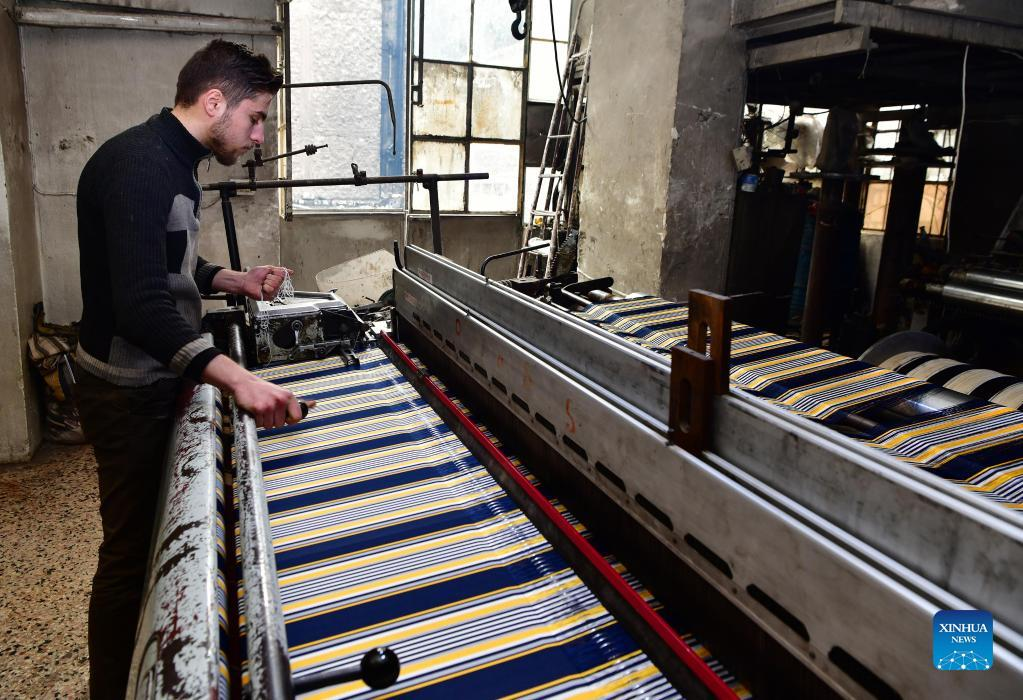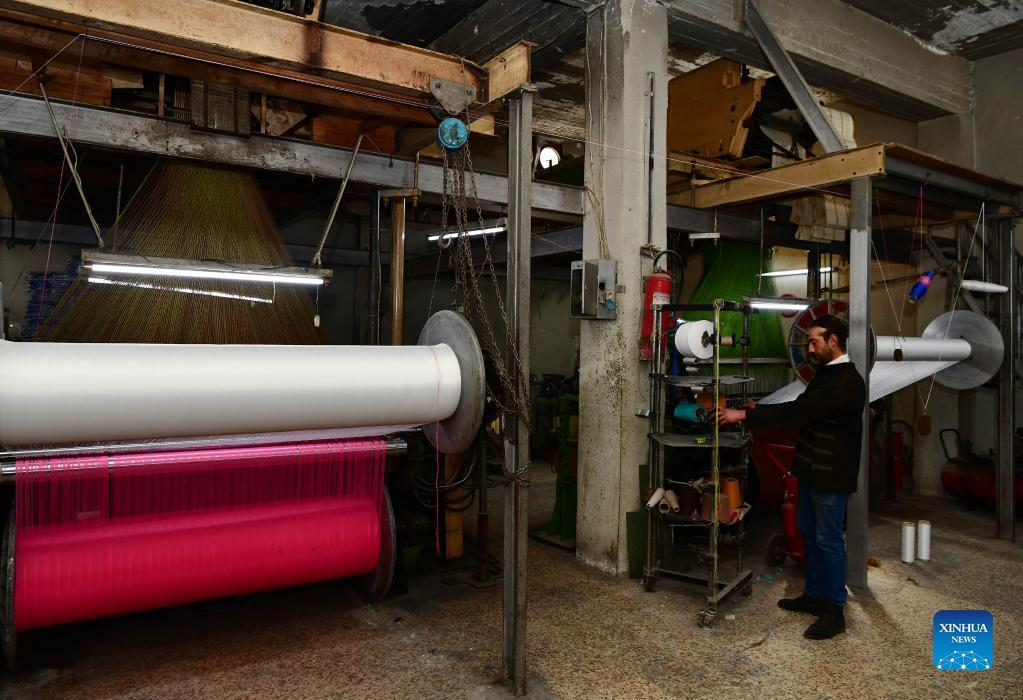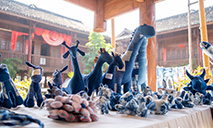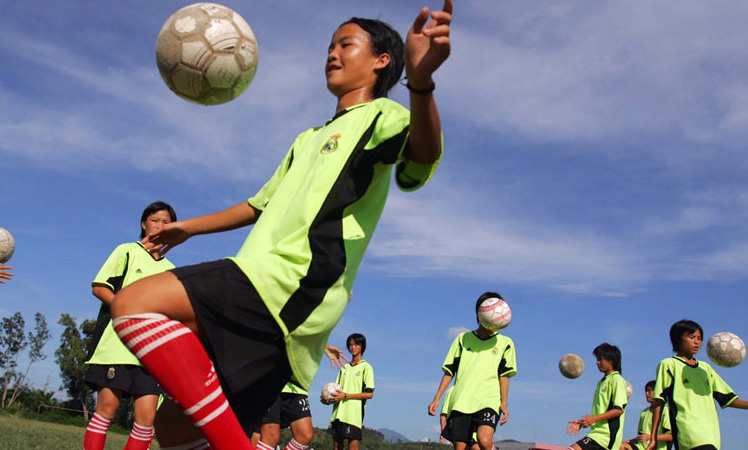Feature: U.S. sanctions still strangling Aleppo's economic vitality as Syrian crisis entering 12th year

A Syrian man works at a textile workshop at the Al-Qatirji industrial city in Syria's northern city of Aleppo on March 7, 2022. As the Syrian crisis is entering its 12th year, the U.S. and Western sanctions remain a major obstacle for normal life to return in the country. The economic sanctions, in particular, have crippled most factories in the war-torn country. (Photo by Ammar Safarjalani/Xinhua)
ALEPPO, Syria, March 14 (Xinhua) -- As the Syrian crisis is entering its 12th year, the U.S. and Western sanctions remain a major obstacle for normal life to return in the country. The economic sanctions, in particular, have crippled most factories in the war-torn country.
After dusting the dirt of war off of themselves and their largely shattered factories, the industrialists of Aleppo city, the commercial and industrial capital of Syria, faced the U.S. and Western sanctions that were like bullets in their feet.
At the Al-Qatirji industrial city of Aleppo, and much of the areas in the eastern part of the city, the scars of war are still obvious, with damaged or partially destroyed buildings, which are still a sign of how vicious the war was in Aleppo.
But despite the war and its destruction, life is beating strongly in that area with the defining sound of machines reverberating here and there amid the energetic movement of passengers, workers and cars.
The Aleppo people are known for their dedication to labor and output. Most factories in Aleppo used to run 24 hours a day, seven days a week before the war. Their hard work earned them and their city the title of the country's industrial and commercial capital.
When the battles in Aleppo city came to a halt in late 2016, the industrialists were quick to pick up the pieces of their days of glory and return to work, even at the lowest capacity.
Xinhua team in Syria has been committed to visiting Aleppo every year to see how the situation in the city is evolving in comparison with other parts of Syria.
Every year, something new is done in Aleppo: factories that are rebuilt, squares are repaired and marketplaces are reopened.
The vitality in Aleppo is so contagious that there is no room for sorrow or wallowing in the past. Hard work combined with inner strength and resilience seems like a successful formula shared by locals.
But with all the positive attitude and the willingness to emerge from under the rubble, here comes another challenge for the people in Aleppo in particular and for Syrians in general: the U.S. and Western sanctions.
It's as if the bombings, destruction and relocation weren't enough to shatter the Syrians' spirits, so the U.S. and its Western allies decided to add to their suffering and pain by imposing crippling sanctions to prevent people from having decent lives.
As the country marks the 11th anniversary of the crisis, Aleppo's industrialists continue to struggle with the shortage of gasoline, electricity, spare parts for their equipment, and the inability to export or import due to sanctions.
According to Abdul-Salam Mzayek, secretary of the Al-Qatirji Industrial Zone, Aleppo's manufacturers were so quick to invest all of their savings to restore their enterprises and start from scratch.
However, he pointed out that the sanctions imposed by the U.S. and its Western allies have had an impact on industrialists, particularly those in the textile industry, who are having difficulty finding spare parts for their looms as well as cotton threads for their production, not to mention to export their products due to the lack of bank transactions between Syria and the rest of the world.
"We have been severely harmed as a result of the sanctions imposed on by the U.S. and Western countries. Textile businesses have been impacted in terms of getting threads and spare components for looms," he said.
He said around 30 to 40 percent of these factories were forced to shut down.
At a textile factory in the Al-Qatirji zone, Saleh Mzayek, the owner, told Xinhua that sanctions have hampered his capacity to get cotton threads, noting that spare parts for his looms are nearly depleted and, if they are found, are highly expensive.
The 53-year-old man said he is working at the minimum capacity in order to make a livelihood for the workers.
"In terms of exports, only Iraq and Lebanon import some, but there are no longer any exports. The situation is difficult, and people's livelihoods are severely impacted," he said.
Abdul-Munem Hashimi, the owner of another textile factory in the same industrial zone, told Xinhua that now they only produce half of what they used to.
"We used to work all day round in the winter and summer," he continued, "but today, because of the sanctions, high prices, and people's declining purchasing power, we can barely make half of our regular production."
He went on that lifting U.S. sanctions is critical for the business to recover to pre-war levels, which would benefit the Syrian people as a whole.
Several conditions, according to him, are required for production to return to its former levels: first, prohibitions on imports and exports should be repealed; second, electricity should be available 24 hours a day, as well as enough fuel in case of an emergency.
That was a glimpse of the suffering of industrialists in Aleppo, and it can for sure be applied to all businesses in Syria that have been affected by the sanctions.
The UN Syria Commission of Inquiry said in a report that in light of the deteriorating living conditions, the commission has called for a review of the implementation and impacts of sanctions currently imposed on Syria.
It added that despite humanitarian exemptions, more is required to mitigate unintended consequences on the daily lives of the civilian population brought about by over compliance.
"Where sanctions are not adequately reviewed, they can lead to further shortages and impede humanitarian assistance, for the most vulnerable populations, with devastating impact on everyone except the political and economic elite," the commission said.

A destroyed building is seen at the Al-Qatirji industrial city in Syria's northern city of Aleppo on March 7, 2022. As the Syrian crisis is entering its 12th year, the U.S. and Western sanctions remain a major obstacle for normal life to return in the country. The economic sanctions, in particular, have crippled most factories in the war-torn country. (Photo by Ammar Safarjalani/Xinhua)

A Syrian man works at a textile workshop at the Al-Qatirji industrial city in Syria's northern city of Aleppo on March 7, 2022. As the Syrian crisis is entering its 12th year, the U.S. and Western sanctions remain a major obstacle for normal life to return in the country. The economic sanctions, in particular, have crippled most factories in the war-torn country. (Photo by Ammar Safarjalani/Xinhua)

A Syrian man works at a textile workshop at the Al-Qatirji industrial city in Syria's northern city of Aleppo on March 7, 2022. As the Syrian crisis is entering its 12th year, the U.S. and Western sanctions remain a major obstacle for normal life to return in the country. The economic sanctions, in particular, have crippled most factories in the war-torn country. (Photo by Ammar Safarjalani/Xinhua)

A Syrian man works at a textile workshop at the Al-Qatirji industrial city in Syria's northern city of Aleppo on March 7, 2022. As the Syrian crisis is entering its 12th year, the U.S. and Western sanctions remain a major obstacle for normal life to return in the country. The economic sanctions, in particular, have crippled most factories in the war-torn country. (Photo by Ammar Safarjalani/Xinhua)
Photos
 Traditional tie-dye products of Buyi ethnic group in Guizhou popular among tourists
Traditional tie-dye products of Buyi ethnic group in Guizhou popular among tourists Girls from mountainous areas in Hainan pursue football dreams
Girls from mountainous areas in Hainan pursue football dreams Chinese artist forms elaborate images using whisked tea foam in revival of Song Dynasty’s cultural splendor
Chinese artist forms elaborate images using whisked tea foam in revival of Song Dynasty’s cultural splendor Wild lilies in full bloom as snow melts in Xinjiang
Wild lilies in full bloom as snow melts in Xinjiang
Related Stories
- Commentary: America, an empire of lies
- Feature: Russia-Ukraine conflict has champagne corks quietly popping in Pentagon: former U.S. official
- Americans to pay more for gasoline, food in 2022: media
- San Francisco Botanical Garden opens to public for free
- China firmly opposes unilateral sanctions: spokesperson
Copyright © 2022 People's Daily Online. All Rights Reserved.






